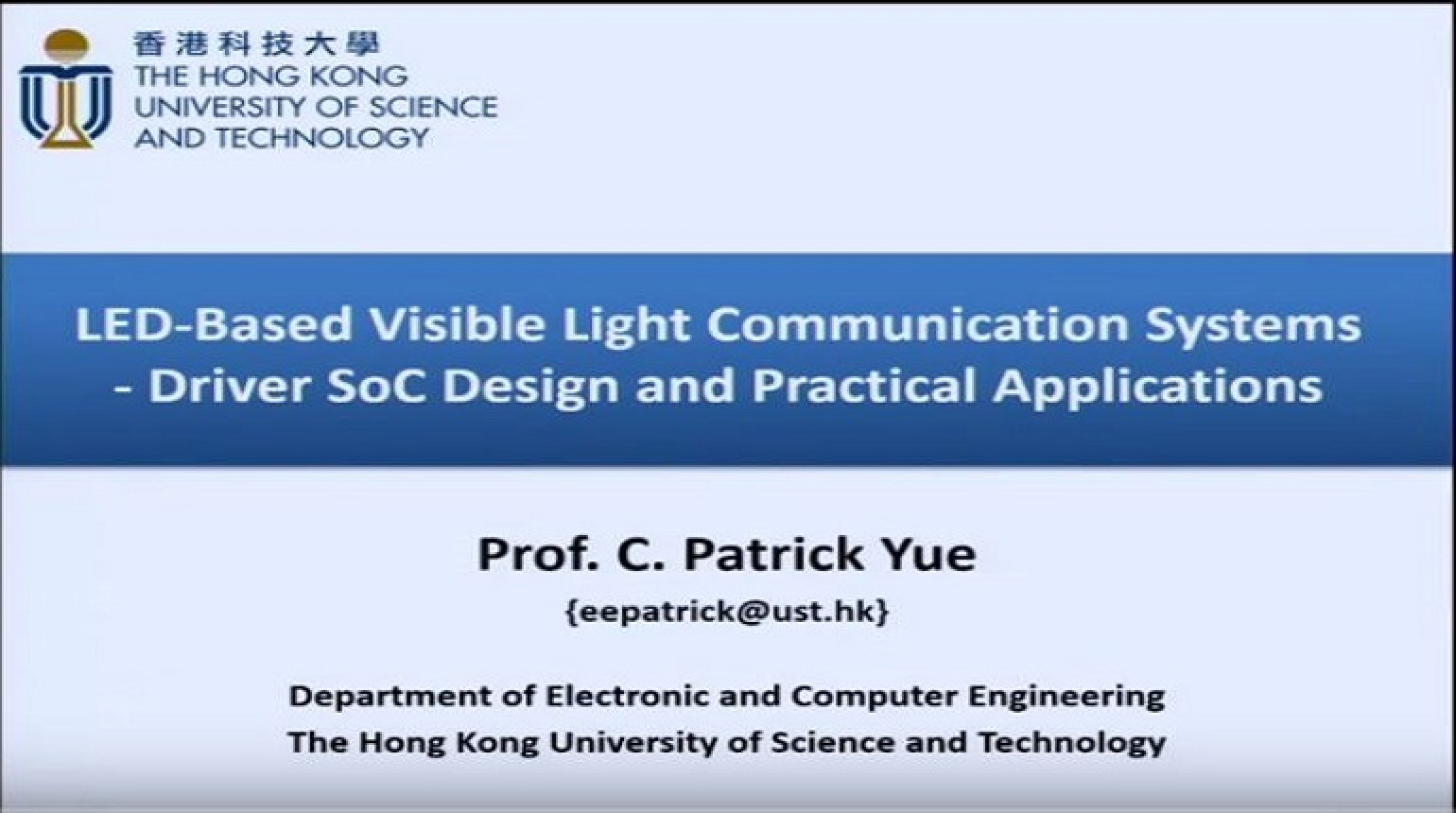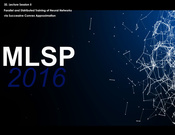
Already purchased this program?
Login to View
This video program is a part of the Premium package:
LED-Based Visible Light Communication Systems Driver SoC Design and Practical Applications Video
- IEEE MemberUS $11.00
- Society MemberUS $0.00
- IEEE Student MemberUS $11.00
- Non-IEEE MemberUS $15.00
LED-Based Visible Light Communication Systems Driver SoC Design and Practical Applications Video
In this talk, Prof. C. Patrick Yue presents two advanced visible light communication (VLC) modulator system-on-chips (SoCs). The first is an IEEE 802.15.7 PHY-I standard compliant VLC transmitter. The second is an active matrix LED microdisplay driver SoC with embedded VLC function. Using ordinary LED lights for VLC has received a great deal of research interest over the past decade due to a number of novel applications including location-based wireless broadcasting through LED lightings, signs with LED backlights and digital LED displays. Most of the VLC SoCs development has focused on wireless optical receiver design including custom CMOS imager whereas VLC transmitters have been predominately based on discrete implementation until recently. More importantly, the power consumption of dedicated VLC transmitters is prohibitively high with bit efficiency in the 100 nJ/bit range. To overcome these issues, this work demonstrates the first fully integrated VLC transmitter SoC compliant with the IEEE 802.15.7 standard embedded with a built-in 8-W LED driver. Excluding the power consumed by the LED driver, the SoC achieves a record VLC transmission efficiency of 5nJ/bit. On the other hand, the miniaturization and integration of inorganic LED display modules have attracted significant research efforts due to their superior brightness and reliability compared to organic LED microdisplay. Combining these two technology trends, this paper also describes an active matrix LED (AMLED) driver SoC with built-in VLC modulation capability to demonstrate a WQVGA smart microdisplay featuring 1.25-Mb/s VLC for enabling LED digital signage as location-based information broadcaster and indoor positioning beacoo: Prof. C. Patrick Yue (S'93-M'98-SM'05-F'15) received the B.S. degree from the University of Texas at Austin in 1992 with highest honor and the M.S. and Ph.D. degrees in Electrical Engineering from Stanford University in 1994 and 1998, respectively. He has been a Professor in Electronic and Computer Engineering at the Hong Kong University of Science and Technology (HKUST) since 2010. Between 2014 and 2015, he served as the Associate Provost for Knowledge Transfer. He is also the Founding Director of the HKUST-Qualcomm Joint Innovation and Research Lab and the Center of Industry Engagement and Internship in the School of Engineering. His current research interests focus on system-on-a-chip design for high-speed fiber-optic communication, visible light communication, and wireless power transfer for bio-implants.
In this talk, Prof. C. Patrick Yue presents two advanced visible light communication (VLC) modulator system-on-chips (SoCs). The first is an IEEE 802.15.7 PHY-I standard compliant VLC transmitter. The second is an active matrix LED microdisplay driver SoC with embedded VLC function. Using ordinary LED lights for VLC has received a great deal of research interest over the past decade due to a number of novel applications including location-based wireless broadcasting through LED lightings, signs with LED backlights and digital LED displays. Most of the VLC SoCs development has focused on wireless optical receiver design including custom CMOS imager whereas VLC transmitters have been predominately based on discrete implementation until recently. More importantly, the power consumption of dedicated VLC transmitters is prohibitively high with bit efficiency in the 100 nJ/bit range. To overcome these issues, this work demonstrates the first fully integrated VLC transmitter SoC compliant with the IEEE 802.15.7 standard embedded with a built-in 8-W LED driver. Excluding the power consumed by the LED driver, the SoC achieves a record VLC transmission efficiency of 5nJ/bit. On the other hand, the miniaturization and integration of inorganic LED display modules have attracted significant research efforts due to their superior brightness and reliability compared to organic LED microdisplay. Combining these two technology trends, this paper also describes an active matrix LED (AMLED) driver SoC with built-in VLC modulation capability to demonstrate a WQVGA smart microdisplay featuring 1.25-Mb/s VLC for enabling LED digital signage as location-based information broadcaster and indoor positioning beacoo: Prof. C. Patrick Yue (S'93-M'98-SM'05-F'15) received the B.S. degree from the University of Texas at Austin in 1992 with highest honor and the M.S. and Ph.D. degrees in Electrical Engineering from Stanford University in 1994 and 1998, respectively. He has been a Professor in Electronic and Computer Engineering at the Hong Kong University of Science and Technology (HKUST) since 2010. Between 2014 and 2015, he served as the Associate Provost for Knowledge Transfer. He is also the Founding Director of the HKUST-Qualcomm Joint Innovation and Research Lab and the Center of Industry Engagement and Internship in the School of Engineering. His current research interests focus on system-on-a-chip design for high-speed fiber-optic communication, visible light communication, and wireless power transfer for bio-implants.
 Cart
Cart Create Account
Create Account Sign In
Sign In

